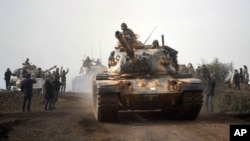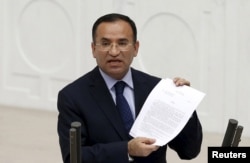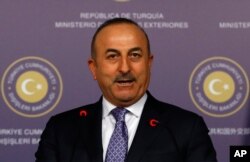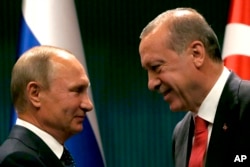Tensions between Turkey and the United States are rising partly due to Washington’s support for Kurdish fighters in Syria. Analysts warn distrust between the NATO allies is a key factor behind the rising tensions and remains the main obstacle to resolving them.
As Turkish-led forces continue their offensive into the Syria’s Afrin enclave, Ankara is demanding that Washington remove its forces deployed with the YPG in the Syrian City Manbij, Turkey’s next target. The militia is a key ally of Washington’s war against the Islamic State but are deemed terrorists by Ankara who accuses them of being linked to a Kurdish insurgency inside Turkey.
“At the moment there is absolutely no trust between the sides,” warns political columnist Semih Idiz, of Al Monitor website. “Clearly Washington doesn’t trust Ankara and there is no trust in Ankara of Washington, not just because of Syria but because of a whole line of issues, since the coup attempt (in Turkey) two years ago.”
Two Turkish ministers accused Washington of being behind the 2016 coup attempt, a charge repeated last week by Yigit Bulut, a top advisor to Turkish president Recep Tayyip Erdogan. Washington has repeatedly denied any involvement, but analysts warn the perception of U.S. involvement by Turkey remains an open wound in relations.
Also fanning the flames is Washington’s failure to honor its guarantee that YPG forces would withdraw from the Syrian city of Manbij after it was captured from Islamic State, a promise made by the Obama administration.
“We (Turkey) remember Joe Biden, he promised to Turkey he would withdraw U.S. and YPG forces from Manbij area” says Mesut Hakki Casin, professor of international relations at Istinye University.
The relationship reached new depths last Wednesday when neither side agreed on what was discussed in a telephone conversation between Erdogan and U.S. President Donald Trump.
“We are facing more than one United States,” Turkish Deputy Prime Minister Bekir Bozdag said Sunday in a television interview. “The Pentagon says something while the State Department says otherwise. We are confused. According to which statement should we act upon?”
The clearest example of Washington's lack of clarity was a statement from the Pentagon that said they would train a 30,000-strong force that would include the YPG, but was later refuted by other U.S. government officials, says analyst Sinan Ulgen of the Carnegie Institute.
“That was one of the triggers for this (Turkish) cross-border operation (into Afrin). This is clearly a case of a lack of coordination, even a lack of clear U.S. strategy in dealing with Turkey, in particular in regard to Syria,” Ulgen said.
Turkish Foreign Minister Mevlut Cavusoglu demanded that U.S. forces deployed in the Syrian city should “immediately” withdraw along with the Syrian Kurdish militia. Erdogan has warned Manbij is the next target of Turkish forces after its operation against the YPG in Afrin.
“Not something we are looking into,” said U.S. General Joseph Votel, commander of the United States Central Command, when asked about Cavusolgu's demand.
Turkish forces are already deployed close to Manbij as part of a previous Turkish military operation into Syria.
“There can be military mistakes. I am afraid of this, there can be accidental clashes,” warns Casin. “If an American kills one Turkish soldier, you will lose forever the Turkish nation. This would result in a collapse of NATO’s southern flank. Who would be the winner? Russia.”
Prizing Turkey away from its western partners has been a decades-long goal of Moscow, analyst Ulgen said.
“When you look at incentives for the other actors who have influence on the ground whether its Moscow, Tehran or the Damascus regime, they have an interest in creating a situation where this undesirable outcome (a U.S.-Turkish conflict) could emerge,” he said.







